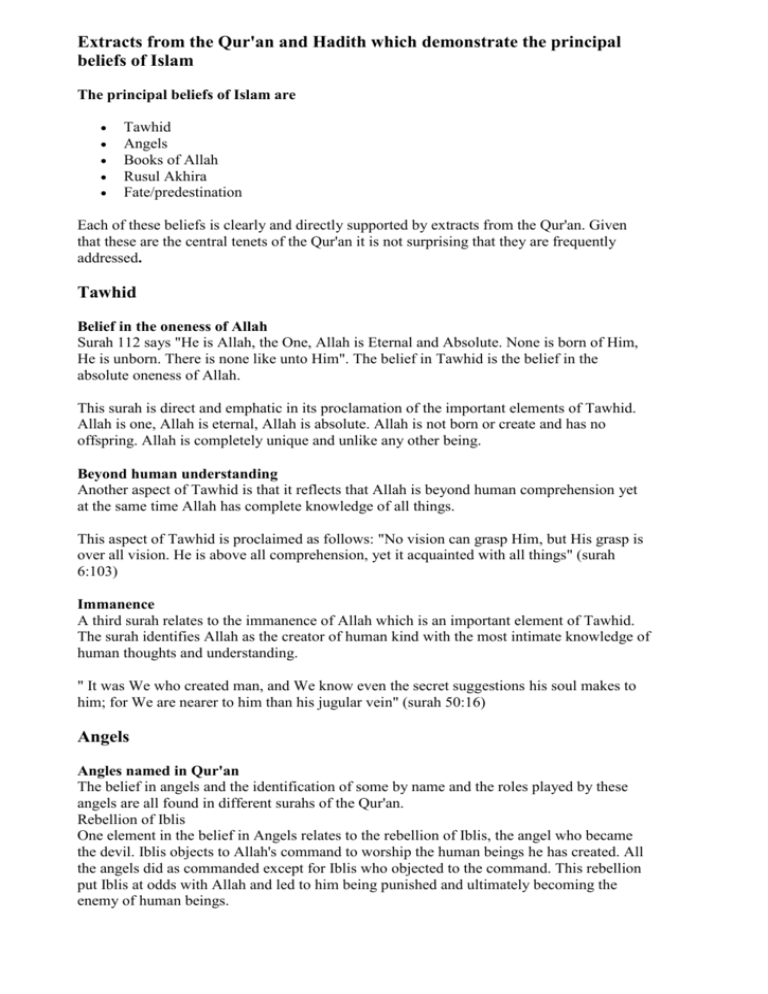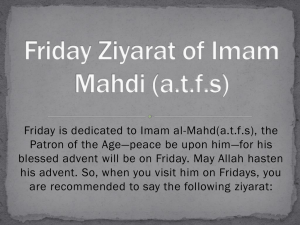Extracts from the Qur`an and Hadith which demonstrate the principal
advertisement

Extracts from the Qur'an and Hadith which demonstrate the principal beliefs of Islam The principal beliefs of Islam are Tawhid Angels Books of Allah Rusul Akhira Fate/predestination Each of these beliefs is clearly and directly supported by extracts from the Qur'an. Given that these are the central tenets of the Qur'an it is not surprising that they are frequently addressed. Tawhid Belief in the oneness of Allah Surah 112 says "He is Allah, the One, Allah is Eternal and Absolute. None is born of Him, He is unborn. There is none like unto Him". The belief in Tawhid is the belief in the absolute oneness of Allah. This surah is direct and emphatic in its proclamation of the important elements of Tawhid. Allah is one, Allah is eternal, Allah is absolute. Allah is not born or create and has no offspring. Allah is completely unique and unlike any other being. Beyond human understanding Another aspect of Tawhid is that it reflects that Allah is beyond human comprehension yet at the same time Allah has complete knowledge of all things. This aspect of Tawhid is proclaimed as follows: "No vision can grasp Him, but His grasp is over all vision. He is above all comprehension, yet it acquainted with all things" (surah 6:103) Immanence A third surah relates to the immanence of Allah which is an important element of Tawhid. The surah identifies Allah as the creator of human kind with the most intimate knowledge of human thoughts and understanding. " It was We who created man, and We know even the secret suggestions his soul makes to him; for We are nearer to him than his jugular vein" (surah 50:16) Angels Angles named in Qur'an The belief in angels and the identification of some by name and the roles played by these angels are all found in different surahs of the Qur'an. Rebellion of Iblis One element in the belief in Angels relates to the rebellion of Iblis, the angel who became the devil. Iblis objects to Allah's command to worship the human beings he has created. All the angels did as commanded except for Iblis who objected to the command. This rebellion put Iblis at odds with Allah and led to him being punished and ultimately becoming the enemy of human beings. "The Lord said to the angels."when I have created Man and breathed My spirit into him then fall ye down and worship him." So all he angels bowed down in worship, all of them together. But not so Iblis the chief jinn: he refused to be among those who bowed down" (surah 15:28-31) Record of actions and role of Azra'il Another aspect of the belief in angels concerns the two angels that are allocated to each human being to keep a record of all their good and bad deeds and thoughts. The belief is that this record is presented to a person on the Day of Judgment. It does not need to be presented to Allah for Allah already knows everything. "Behold two guardians appointed to learn his doings, one sitting on his right and one on the left. Not a word does he utter but there is a sentinel by him, ready to note it." (surah 50:17-18). Another surah identifies the role of Azra'il as the one who receives the soul of a person at the point of their death. "He sends forth guardians to watch over you and when death overtakes you, the messengers will carry away your soul." (surah 6:61) Books of Allah The Qur'an testifies to the books of Allah, revealed in previous times to the biblical prophets such as Musa and Isa. Musa and Isa Muslims believe that these books were once complete revelations, however, they have been lost or altered over time and as such are no longer a reliable source of revelation. They are nevertheless still respected by Muslims. Testimony to books of Allah Surah 6:91 is an example of the Qur'an's testimony to these books. "Those who say "Allah does not send down revelations to humans" do not judge rightly. Who sent down the book which Musa brought - a light and guidance for humanity? But you have made it into separate books for show, and you conceal much of its contents" Muhammad called to believe in the past prophets Another example of the belief in the revelation before Muhammad is the text which calls on the Prophet to not only believe what has been revealed to him but also to believe the revelation that came before him. "believe in what has been sent down to thee Muhammad and what has been sent down before thee" (Surah 2: 4). Rusul Messengers of Allah The belief in prophecy is another principal belief of Islam. This belief holds that Allah is revealed through prophets who are given a message to proclaim. One text from the Qur'an affirms the fact that Allah chooses people to proclaim the message. The choice of the messenger is Allah's and Allah then guides them and directs them in what to proclaim. "Allah chooses for Himself whoever He pleases, and guides to Himself those who turn to Him" (surah 42:13). History of Prophecy The tradition of prophecy goes back well before the time of the Prophet Muhammad. Indeed Muhammad is regarded as the last and the greatest of the Prophets. Among the many prophets to proclaim the word of Allah was the biblical prophet Ibrahim. The following surah gives witness to the importance of Ibrahim as a model of a prophet who submitted fully to the will of Allah and was regarded as true in faith. As a consequence of his faith, Ibrahim is regarded as a friend of Allah. "Who can be better in faith than one who submits his whole self to Allah, does good and follows the way of Ibrahim, the true in faith? For Allah did take Ibrahim for a friend." (surah 4:125) Musa and Isa The next example continues the same recognition of the prophets of old. On this occasion it is Musa and Isa who are mentioned as recipients of the revelation of Allah. We gave Musa the Book and followed him up with a succession of Apostles: We gave Isa the son of Maryam clear signs and strengthened him with the Holy Spirit. (surah 2:87) Akhira Paradise and jahannam Akhira refers to the end . It is the belief in the life after death either in paradise with Allah or in jahannam suffering eternal separation from the love of Allah. Day of Judgment Each person will be required to face a Day of Judgment at which time their words, deeds and thoughts will be revealed to them and they will receive either reward or punishment as a consequence of their life. Each person stands alone On this Day of Judgment every person will be required to stand alone and accept the consequences of their actions without the support of any other. The following extract from the Qur'an plainly indicates that a person will have to bear their own burden at this time and can neither give help to or receive help from another. "One burdened soul shall not bear the burden of another. And even if the heavy-laden soul should cry out for its burden to be carried not one bit of it shall be carried, not even by the next of kin" (surah 35:18). Another element of the Day of Judgment is the realisation that the actions of a persons life will ultimately affect only themselves. The following text from the Qur'an highlights the reality that good actions carried out will bring benefit to them while evil actions will conversely come back against them. "Your good actions will benefit only you, while evil harms only the person who does it." (surah 41:46) Fate/Predestination Knowledge of the future Part of the Muslim belief in predestination is that Allah is all knowing and as a consequence has full and complete knowledge of the future actions and therefore destiny of all people. This knowledge, however, does not in any way limit a person's ability to choose freely. The following text highlights the knowledge of Allah which is central to this aspect of Muslim belief. "Whatever Allah grants to humanity out of His mercy, no one can withhold and what He withholds no one can grant apart from Him. He is the source of Power, the All-Knowing" (surah 35:2) Individual situations not relevant A second element of the belief relating to predestination is the idea that a person can be placed in any circumstances or situation but that it is the way they deal with the situation rather than the situation itself that matters. Allah Will of AllahMuslims believe it is futile to complain about a situation in life because they believe that all things happen according to the will of Allah and that nothing happens by chance. The following extract from the Qur'an gives witness to the idea of everything happening according to the will of Allah and the futility of resisting Allah's will. "If Allah lay the touch of trouble on you, no one can deliver you from it save Allah alone; and if He wills good for you, no one can prevent His blessing. He confers them on His servants as He chooses" (surah 10:107) Free will The following extract from the hadith confirms an important element of Muslim belief relating to the free will of people and their capacity to exercise freedom of choice. The hadith indicates that all people will have to give account of themselves in four areas. In each area the question relates to their own choices and actions in the particular area confirming that they are indeed free to act according to their own choices. However, along with the freedom of choice comes the reality of responsibility for those choices. "On the Day of Judgment no step of a servant of Allah shall slip until he has answered concerning four things: his body and how he used it his life and how he spent it his wealth and how he earned his knowledge and what he did with it" (Hadith)









